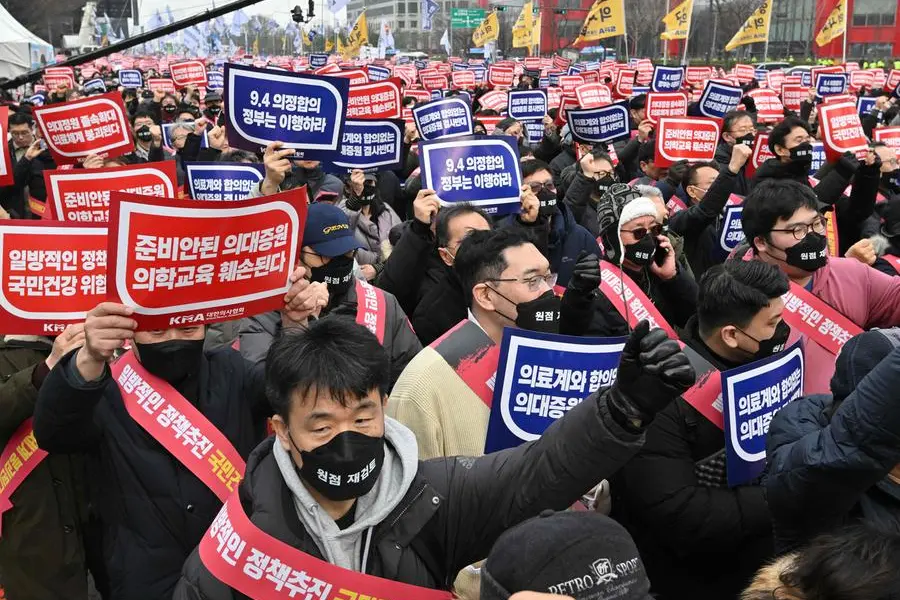PHOTO
Thousands of South Korean doctors protested Sunday in Seoul in an escalating standoff with the government over medical training reforms, which has seen junior doctors quit en masse, plunging hospitals into chaos.
Around 10,000 junior doctors quit and stopped working nearly two weeks ago to protest hikes to medical school admissions from next year meant to combat shortages and an ageing society.
The striking professionals have defied a February 29 government deadline for them to return to work or face legal action, including possible arrests or suspensions of their medical licenses.
The protestors wore black masks and waved signs saying: "We oppose the medical school admissions increase".
"The government is pushing the reforms unilaterally and that the doctors can not accept under any circumstances", Kim Taek-woo of the Korea Medical Association told the crowd of protestors.
"The government is very aware of the reasons why all doctors are opposing the increase in the medical school admissions but are exploiting policies to turn doctors into slaves forever".
The mass work stoppage has taken a toll on hospitals, with crucial treatments and surgeries cancelled, prompting the government to raise its public health alert to the highest level.
Around half of the surgeries scheduled at some major hospitals have been cancelled since last week, according to the health ministry.
Under South Korean law, doctors are restricted from striking, and the government this week requested police investigate people connected to the stoppage.
While the return to work deadline has passed, the government would still "exercise utmost leniency for trainee doctors if they return to work by the end of today", Interior Minister Lee Sang-min said on Sunday in a KBS television interview.
"But if they don't come back by today, the government will have no choice but to act sternly in accordance with laws and principles."
Lee reiterated the government's commitment to its reform plans, saying even the 65 percent increase in medical admissions "isn't that large" considering the importance of the healthcare sector.
- Undemocratic -
South Korea's government is pushing to admit 2,000 more students to medical schools annually from next year to address what it calls one of the lowest doctor-to-population ratios among developed nations.
Doctors fear the reform will erode the quality of service and medical education, but proponents accuse medics of trying to safeguard their salaries and social status.
Polling shows up to 75 percent of the public support the reforms.
President Yoon Suk Yeol has taken a hard line on the striking doctors -- and has seen his approval ratings tick up as the standoff drags on.
With legislative elections in April, and Yoon's party looking to win back a parliamentary majority, the government is unlikely to compromise quickly, analysts said.
But doctors have also vowed not to back down, saying the government's plan did not address the sector's real problems.
"We have nowhere to retreat anymore. We will not just sit idly by the government acting undemocratic," Lee Jeong-geun, interim head of the KMA, said at the Sunday protest.





















